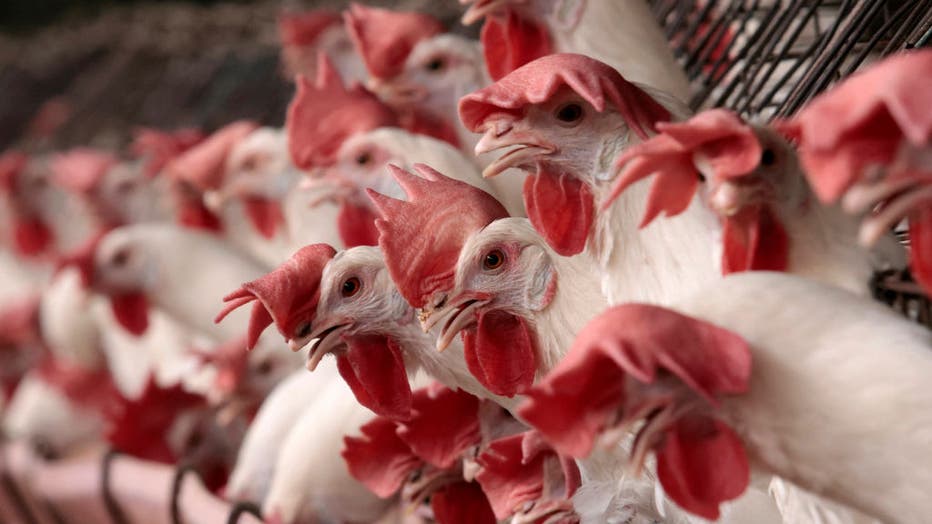Trump FDA layoffs included staff working on bird flu response: Report
How worried should you be about bird flu?
We've seen an increase in bird flu numbers over the last few months, raising concerns for safety, egg prices, and much more. The virus is now impacting dairy cows and the people who care for them. Infectious disease expert Peter Chin-Hong joins LiveNOW's Christina Evans to give us the latest update on the bird flu and discuss whether we should be concerned or not.
WASHINGTON - President Donald Trump’s push to dramatically shrink the federal government has reached the frontlines of the country’s bird flu monitoring system.
According to a Reuters exclusive, Tuesday’s mass layoffs at the U.S. Food and Drug Administration included staff overseeing efforts to track avian influenza — a virus that has killed millions of birds and infected hundreds of dairy herds.
The cuts are part of Health Secretary Robert F. Kennedy Jr.’s plan to lay off 10,000 employees across the Department of Health and Human Services. But some experts say the decision could have serious consequences.
Staff who tracked pet food contamination were cut
What we know:
The layoffs targeted the FDA’s Center for Veterinary Medicine, affecting leadership, administrative workers, and teams handling policy, legal, and external communications, a source familiar with the matter told Reuters. One employee said nearly all administrative staff were terminated, including managers in the director’s office.
The center oversees the Veterinary Laboratory Investigation and Response Network, which monitors pet food for contamination — including testing for bird flu. That system previously led to recalls of raw pet food linked to the deaths of house cats.
RELATED: Mass layoffs begin at HHS, CDC, NIH, FDA
While lab personnel were not cut directly, the source said that removing their support staff could effectively stall operations.
What we don't know:
The FDA has not commented publicly on the layoffs or how they will affect its veterinary and food safety oversight. The total number of staff terminated at the center remains undisclosed.
It’s also unknown whether the agency has a contingency plan to resume full operations. That includes coordinating with state labs and researchers studying animal infections and the broader risks to the food supply.
RELATED: Bird flu solution: Vaccinate chickens or slaughter every infected flock?
Veterinarians and researchers voice concern
What they're saying:
Kristy Pabilonia, clinical diagnostics director at Colorado State University, told Reuters she depends on the FDA center to report suspected cat infections linked to contaminated pet food. "It keeps me up at night thinking that there would be a chance that I wouldn’t have someone to report to," she said.

FILE - Chickens are pictured at a poultry farm in Tepatitlan, Jalisco State, Mexico, on June 6, 2024. (Photo by ULISES RUIZ/AFP via Getty Images)
Keith Poulsen, director of the Wisconsin Veterinary Diagnostic Lab, warned that the cuts could disrupt bird flu testing tied to raw milk cheese — a concern as nearly 1,000 U.S. dairy herds have tested positive for avian flu in the past year. "You chop off the head of the leadership, and now we have to reinvent that wheel," he said.
The economic toll of the outbreak
By the numbers:
These numbers highlight the scale of the outbreak and the stakes for public health. With bird flu continuing to affect food supply chains and pose risks to animals and potentially humans, experts say consistent oversight and testing are essential — especially as the virus evolves and spreads.
- 170 million: Estimated number of birds killed by avian flu since 2022
- 1,000: Dairy cattle herds infected over the past year
- Record high: Egg prices spiked during peak outbreaks, though have recently declined
Federal coordination remains vital in containing the virus, especially as concerns rise over raw animal products and cross-species transmission.
Kennedy’s raw milk stance raises questions
The other side:
Health Secretary Kennedy has long supported the consumption of raw milk, even as public health agencies caution against it during avian flu outbreaks. His role in the FDA cuts has raised questions among health officials about the administration’s commitment to food safety and outbreak prevention.
What could come next for food safety oversight
What's next:
The sudden loss of personnel at the FDA’s veterinary center may complicate ongoing efforts to contain bird flu and prevent future outbreaks. Public health officials have emphasized the importance of testing and surveillance — especially for unpasteurized milk and pet food — to curb the virus’s spread.
Although field labs and franchise operations remain active, experts warn that without central leadership and coordination, national response efforts could be significantly weakened. Further staffing cuts may deepen those concerns in the months ahead.
The Source: This article is based on exclusive reporting from Reuters, published April 1, 2025. All quotes and data were provided by veterinary professionals and government sources cited in that report. This story was reported from Los Angeles.

